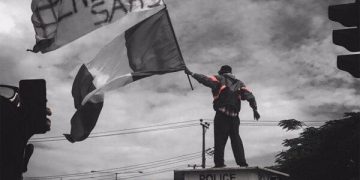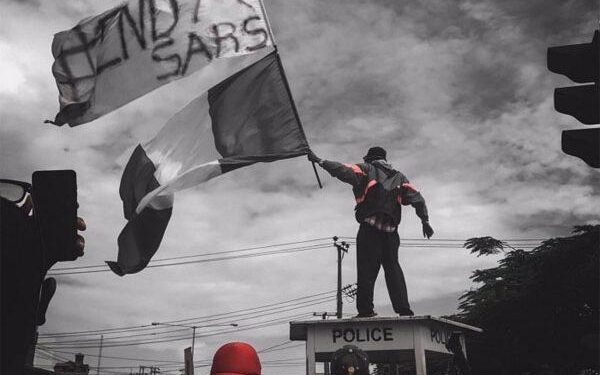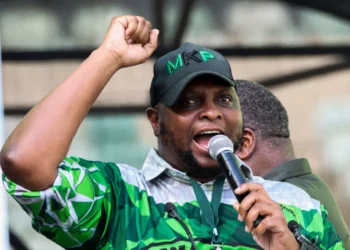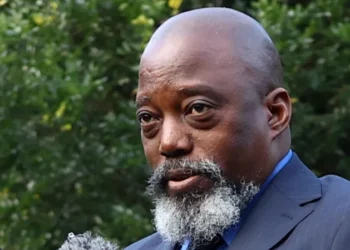By Emmanuel Nduka
On October 20, 2020, Nigerian youths united against the dreaded Special Anti-Robbery Squad, SARS, and the Federal Government. Key among their demands, was an end to police brutality. They were fed up with the mistreatment of the squad which had led to avoidable deaths and disfigured body alignments of those lucky to remain alive.
Their gathering pricked the conscience of the government. The government who themselves had assumed the status of gods ruling over men, were reminded that power belongs to the people. The government that had become used to taking power by force or by fraud, learnt the damning lesson that Nigerians, especially the youthful generation, are capable of anything when they are united.
Interestingly, the momentum towards the memorable protest was gathered on social media. No other administration had been battered, embarrassed and dragged on social media like the current administration. Locations, take-off time and other logistics for the protests nicknamed ‘#EndSARS protest’, were planned mostly on Twitter. This was the beginning of the current government’s hatred for the Nigerian youths and their use of Twitter against it. Months after the protests, the government went ahead to ban the usage of Twitter in Nigeria.
Aside gathering momentum on Twitter, the nation’s tertiary institutions were all on strike at the time, thus, youths were home and readily available to protest. Thousands of young Nigerians occupied strategic places in parts of the country at the time, demanding a total disbandment of SARS over alleged human rights violations.
While the protests held for several days, sad events unfolded. In the Lekki Toll Gate area of Lagos State which served as the major anchor point from where other nationwide protesters drew inspiration from, there was bloody massacre. A team of dare-devil security operatives who stormed the venue of the demonstration, opened fire on unarmed protesters. They were captured on CCTV. The video evidence was later manipulated and rebuffed.
Speaking at a sitting of the Judicial Panel of Inquiry set up by the Lagos State Government via the Federal Government to look into the matter, Chief Pathologist of the Lagos State University Teaching Hospital, LASUTH, John Obafunwa, confessed that at least 99 people were killed during the shooting and had their bodies deposited at a morgue in the state. The victims according to him, include three that were shot at close range by soldiers.
Mr Obafunwa, a Professor of Medicine and Head of the Department of Morbid Anatomy at the Lagos University College of Medicine, said autopsies were done on the 99 dead bodies which were brought to the morgues between October 19 and 24, 2020.
WHAT HAS CHANGED?
In the heat of the EndSARS protests which shook Nigerian cities for days, the government was forced to scrap the unit on October 11, while demonstrators remained on the streets with more demands. Rather than do the needful, Nigerian authorities perceived the youth-led movement as being anti-government and intending to overthrow the current administration. Aside disbanding the SARS unit, there has not been any meaningful reform till date.
“Police brutality exists till today. Police extortion of citizens at gunpoint remains at an all-time high and when these cases are reported by FIJ, for instance, the police often refund the victims but they hardly punish the errant officers,” Fisayo Soyombo, founder of the Foundation for Investigative Journalism, FIJ said, adding that his platform has reported “scores” of cases of police brutality over the past year.
Recently, a trending video of armed policemen traumatizing commuters in Kogi State, sent cold reminders of the need for the call to an end to police brutality. At Onipanu in Lagos, a certain Abbas during his four-day detention by the police, said he was beaten by police officers and a cellmate, was not given food for long stretches of time and was denied access to family and friends. The cases are many and unending.
JUSTICE NOT SERVED
One year later, no commiserate justice has been served. No one is has been officially brought to book. No one is going to jail for the Lekki massacre. Sadly enough, the Lagos Panel held its valedictory sitting on Monday, October 18, after 131 proceedings out of the 235 petitions it received. Only 14 petitions were submitted. Some sarcastic critiques suggested that the Panel quickly rounded up its proceedings over fear of the planned one year anniversary protest.
Chairman of the Panel, Justice Doris Okuwobi who read out the decisions of the panel on Monday, announced the award of N148.2 million to 23 deserving petitioners. The beneficiaries include: Michael Owoicho – N10 million, Fatai Ogunseye (late) – N10 million, Adeola Mukaila – N700,000, Stella Edegwa – N500,000, Akapo Adekunle – N10 million, Mustapha Ramot – N10 million, Kufre Jackson – N5 million, Ikechukwu Iloamuzor (late) – N10 million, Segun Adekoya (unlawful arrest by the police) – N1 million, Yusuf Omole – N10 million, and Segun Ishola (injuries sustained from gunshot) – N5 million.
Others are Mr and Mrs Julius Adeogun – N10 million, Okoronkwo Sylvester (late) – N10 million, Titi Agnes – N10 million, Prince Akaba – N500,000, Chukwudera Uba – N4 million, Seun Bamgbose – N10 million, Abayomi Likinyo – N4 million, James Arebha – N4 million, Juliana Adeoti – N1 million, Adaeze Samson – N2.5 million, Yemi Abdulkareem – N10 million, and Gabriel Ayedungbe – 10 million.
With this, the Panel according to Justice Okuwobi awarded a total of N410 million to 70 victims in all. She also revealed that the Panel has concluded its investigations into the shootings, adding that it is working on its report which would be submitted to the state government, and would be made public subsequently.
The Panel further assured petitioners that its recommendations would include compensation to victims of the Lekki tollgate incident, if any was identified, and that recommendations will also be made for policemen who were victims of the #EndSARS protests. The nine-man Judicial Panel of Inquiry added that petitions that have been partly heard, and those that were not concluded or heard, would be sent to the supervising Lagos State Ministry of Justice, which may set up a human rights body to handle them.
THE CHARGE
Without justice in sight, Nigerian youths must now move away from holding protests against government (at least not with the current administration), to taking over power. The young people should assume in their minds that ordinary protests cannot change the mindset of the current set of Nigerian leaders. They should learn from past experiences and adopt a more strategic and diplomatic way to dislodge the government. These men who spent billions for campaign to get into office will not leave their seats over protest.
As 2023 draws near, the youths must be prepared. They must get their Permanent Voters Cards (PVCs), and as well identify with a political party. They must also package themselves under an organized platform with a proper leadership framework, as government cannot deal with faceless groups people. They should also begin to hold those in leadership positions accountable, and desist from singing praises to politicians at public places to extort money. Instead of hailing them, they should begin shaming them.
The lives of youths are sacrosanct. They must preserve it. Families of those killed are still bleeding and are yet to recover. The monetary compensation going to the lucky families will not bring back the lives lost. The bitter reality is that African governments do not recognize democratic tenets. With 2023 in sight, the youths must now mould their united voice into a competent candidate and make use of their voting power to fight their way to leadership positions in the country. One cannot protest in Nigeria at this time without the government dispatching soldiers as if the country is mobilizing for world war III. The youths must apply wisdom! The youths must start strategizing politically for 2023! They must channel the energy reserved for the protests to prepare for 2023!
The Northern youths who have been mostly used by the current government to usurp peaceful protests, must open their eyes. While they chose not to identify with the protests in 2020, their lives are not any safer in their regions. They die daily in the hands of bandits and terrorists. Their mothers, fathers and siblings are lavishing in IDP camps. But yet they are stubborn, and fond of hypocrisy. They’re quick to kick against anything or anyone that disagrees with the current administration. They practice a brotherhood support system. He is my brother, let him be there, whether he is doing well or not.
GOVERNMENT’S INTERVENTION
In a deliberate attempt to wade into the planned protests in commemoration of their slain comrades on October 20 last year, the National Economic Council, NEC advised the organisers to reconsider their plans to stage any protest since the demonstrations would be held in various parts of the country.
The Vice President Yemi Osinbajo-led NEC made the call last Friday in an advisory on public protests, saying such a plan should be shelved considering the nation’s security situation.
“While appreciating the role of lawful peaceful protests in the advancement of public discourse under democratic governance, the National Economic Council (NEC) strongly advise those planning public protests across the country to mark the anniversary of the #EndSARS, to consider other lawful alternative means of engagement.
“This is because of the current security situation across the country and the possibility of such protests being hijacked by armed hoodlums and other opportunistic criminals to cause mayhem at such protest events and venues. Council, therefore, urges the organisers to reconsider their plan,” the advisory stated.
In a bid to address the concerns raised by the protesting youths, NEC stated that the government both at the federal and state levels, has already taken actions to address the grievances that led to the protests. NEC listed them to include the disbandment of SARS, broad police reforms, the establishment of judicial panels of inquiries to investigate allegations of human rights violations by members of the Nigeria Police Force and other security agencies, and prosecution of police personnel indicted by the panels.
The council further explained that recommendations of the panels were already at various stages of implementation, including the setting up of Victims Compensation Funds from which “several victims have received payments of sums awarded to them” by the panels.
“These are commendable actions that ought to be taken to a logical conclusion in a peaceful atmosphere. Organisers of the planned protests should explore the various channels of communication with governments at various levels to advance their positions and avert the breakdown of law and order that may result from such public protests,” NEC added.
Meanwhile, the Lagos State Commissioner of Police, Hakeem Odumosu, made a U-turn on his earlier warning against any gathering or organisation of protest in the state.
Speaking to journalists last Saturday by the sidelines of the Peoples Democratic Party, PDP State Congress election in Lagos, Odumosu described protests as a right citizens are entitled to, adding that the state police command would be ready to protect protesters.
In his earlier stance, he had warned that “The police in the state will not fold their arms and allow some misguided elements disrupt the peace and serenity currently being enjoyed in the state. To forestall breakdown of law and order, the police will use all legitimate means within their constitutional powers to suppress the planned protest.”
But in a change of mind, Odumosu said the police only want the organisers of such protests to work together and have a meeting point.
“If you want to protest, it is your right under the law but you don’t have to block the road because, in the process of obstructing the road, you are no longer protesting for a better life for people.
“However, what happens to pregnant women in an emergency, what happens to collapsed buildings, fire incidents when the roads are blocked?
“Don’t forget that this is Lagos, it is the economy of the country and it is equally a working day and you can imagine those lives that earn their living on a daily basis. There are some people that cannot feed their families when protesters block the road definitely,” he affirmed. The commissioner appealed to the #EndSARS protesters to give the police adequate information to ensure their protection and free flow of traffic in the state.
Lending his voice to the issue, Senior Advocate of Nigeria, Femi Falana, held that the police lacks the power to ban public protests in Nigeria. “The police’s stance is “illegal as they constitute a gross infringement of the fundamental rights of the Nigerian people to freedom of expression and freedom of assembly guaranteed by sections 38 and 40 of the Nigerian Constitution as well as articles 9 and 10 of the African Charter on Human and Peoples Rights Act,” he affirmed.


































